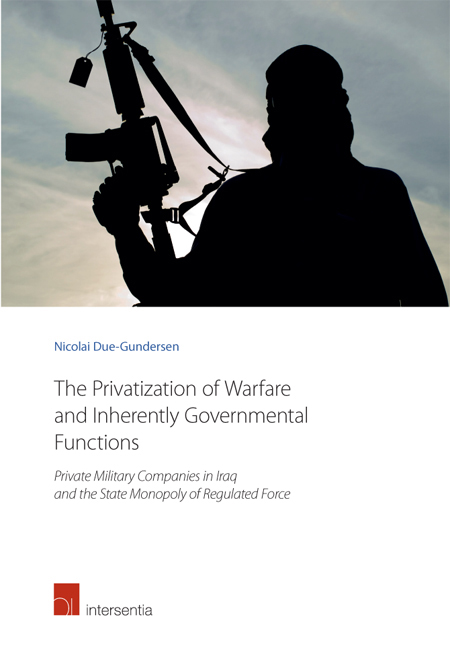 The Privatization of Warfare and Inherently Governmental Functions
The Privatization of Warfare and Inherently Governmental Functions Book contents
- Frontmatter
- Acknowledgments
- Contents
- Chapter 1 Introduction
- Chapter 2 The Recent History of PMCs
- Chapter 3 Literature Review
- Chapter 4 Methodology
- Chapter 5 Theoretical Approach and Terminology
- Chapter 6 Research Design
- Chapter 7 Main Analysis
- Chapter 8 The International Legitimacy of the ICoC
- Chapter 9 Final Conclusion
- Chapter 10 Addendum: The Business of Human Rights and Militarized Resource Companies (MRCs)
- References
- Appendices
Chapter 9 - Final Conclusion
Published online by Cambridge University Press: 21 September 2018
- Frontmatter
- Acknowledgments
- Contents
- Chapter 1 Introduction
- Chapter 2 The Recent History of PMCs
- Chapter 3 Literature Review
- Chapter 4 Methodology
- Chapter 5 Theoretical Approach and Terminology
- Chapter 6 Research Design
- Chapter 7 Main Analysis
- Chapter 8 The International Legitimacy of the ICoC
- Chapter 9 Final Conclusion
- Chapter 10 Addendum: The Business of Human Rights and Militarized Resource Companies (MRCs)
- References
- Appendices
Summary
This thesis has attempted to provide relevant background information on the contemporary history of PMCs, focusing on case studies in Iraq that have provoked questions of PMC legitimacy and legality. In addition, the Iraqi context of PMCs has been complemented by an analytical overview of recent regulatory attempts such as the Montreux Document and its implementation in Host and Territorial States. Such focus on the Document has provided an appropriate framework for Fabienne's explication of legitimacy, which itself has fostered further discussion of the role the ICoC may have in managing PMCs as a global regulatory phenomenon.
Legitimacy as a state-bound concept has been explored through the primary research question: Is the outsourcing of conflict and inherently governmental tasks to PMCs eroding state monopoly over the regulation of force and, subsequently, public perceptions of state authority and/or legitimacy? This question was framed and explored in a three-point outline. First, the research question was placed in the context of traditional and political definitions of state obligations to its subjects and how violence or force can be distinguished and appropriate to territorial understandings of state sovereignty. Second, the nature of legitimacy was explored and defined under Fabienne's discussions of political legitimacy. This discussion complemented theoretical references to both Globalization and Andrew Wyatt-Walter's theory of Hegemonic Stability by addressing the contention between state-bound governance and the notion of global governance or International Legitimacy. Third, Fabienne's criteria for legitimacy filtered two case studies of public discourse related to the 2007 Nisour Square Massacre and the 2004 Abu Ghraib Prison Scandal, respectively. Subsequent analysis of public discourse and so-called ‘selfdiscourse’ from corporate actors involved in each case study has examined to what extent such discourse has employed words such as ‘force’ and other words and phrases that may imply an aggressive, belligerent or militant context.
In addition, analysis has taken into account the protective image of security services that Blackwater/Academi originally presented through its own ‘self-discourse’, and how this image has changed into one of more aggressive commercialism.
Information
- Type
- Chapter
- Information
- The Privatization of Warfare and Inherently Governmental FunctionsPrivate Military Companies in Iraq and the State Monopoly of Regulated Force, pp. 175 - 178Publisher: IntersentiaPrint publication year: 2016